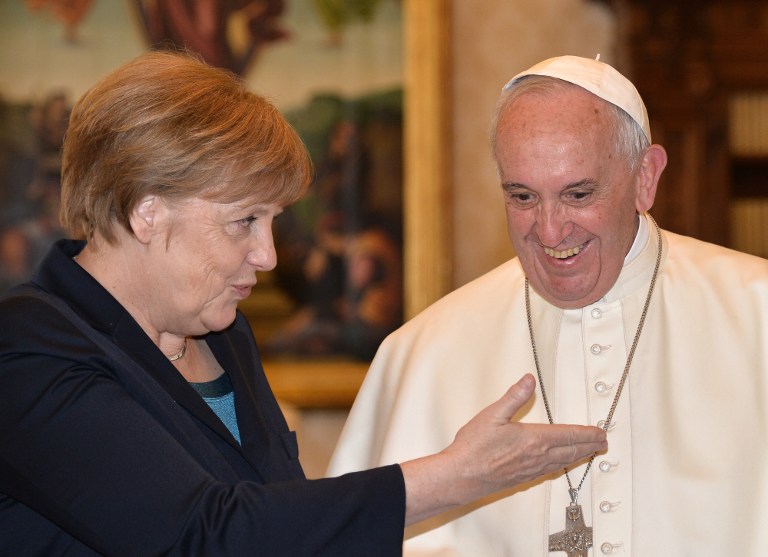-
Tips for becoming a good boxer - November 6, 2020
-
7 expert tips for making your hens night a memorable one - November 6, 2020
-
5 reasons to host your Christmas party on a cruise boat - November 6, 2020
-
What to do when you’re charged with a crime - November 6, 2020
-
Should you get one or multiple dogs? Here’s all you need to know - November 3, 2020
-
A Guide: How to Build Your Very Own Magic Mirror - February 14, 2019
-
Our Top Inspirational Baseball Stars - November 24, 2018
-
Five Tech Tools That Will Help You Turn Your Blog into a Business - November 24, 2018
-
How to Indulge on Vacation without Expanding Your Waist - November 9, 2018
-
5 Strategies for Businesses to Appeal to Today’s Increasingly Mobile-Crazed Customers - November 9, 2018
Pope Francis to receive the prestigious Charlemagne Prize
Report says Argentine-born Francis, the first non-European pontiff in 13 centuries, is not the first Charlemagne Prize laureate among popes. “I dream of a Europe where being a migrant is not a crime but a summons to greater commitment on behalf of every human being”, the Pope said.
Advertisement
Francis called Europe “weary, yet still rich in energies and possibilities” and said it was “increasingly entrenched, rather than open to initiating new social processes capable of engaging all individuals and groups in the search for new and productive solutions to current problems”.
Citing “an impression that Europe is declining”, the pope asked: “What has happened to you, the Europe of humanism, the champion of human rights, democracy and freedom?” “I ask myself: How we can involve our young people in this building project if we fail to offer them employment, dignified labour that lets them grow and develop through their handiwork, their intelligence and their abilities?”
In his address the Pope explained that he wanted Europe to look beyond the “present borders of the union” and to welcome newcomers who are looking for “acceptance because they have lost everything”.
The pope – a South American son of Italian immigrants – evoked USA civil rights leader Martin Luther King Jr., telling European heads-of-state and top-level representatives that he had a dream of a divisive Europe coming together to protect the rights of everyone, especially families and migrants.
Pope Francis has been presented with the International Charlemagne Prize, one of Europe’s most prestigious prizes, for his, “message of hope and encouragement”. He is the second religious leader to receive the prize, the first being St. John Paul II, who in 2004 was awarded an “extraordinary” version of the prize, while the ordinary version was given to Irish politician Patrick Cox.
German Chancellor Angela Merkel, left, exchanges gifts with Pope Francis on the occasion of their private audience, at the Vatican, Friday, May 6, 2016.
European Commission President Jean-Claude Juncker and European Parliament President Martin Schulz explained the decision to give the award to such a regular and prominent critic of the EU in a column for France’s Le Monde.
The pope noted that the desire for a united Europe “seems to be fading” with people “tempted to yield to our own selfish interests and to consider putting up fences here and there”.
Borrowing a phrase from writer and Holocaust survivor Elie Wiesel, the Argentinian pontiff said Europe needed a “memory transfusion” to free itself from the temptation of “quick and easy short-term political gains”.
He stressed the need to go back and listen to the voice of Europe’s forefathers, “were prepared to pursue alternative and innovative paths in a world scarred by war”.
“Today, more than ever, their vision inspires us to build bridges and tear down walls”, the 79-year-old added. “That vision urges us not to be content with cosmetic retouches or convoluted compromises aimed at correcting this or that treaty, but courageously to lay new and solid foundations”.
“Forms of reductionism and attempts at uniformity, far from generating value, condemn our peoples to a cruel poverty: the poverty of exclusion”, said Francis.
Europe has lost its bearings and “the values that we urgently need to rediscover and strengthen are essentially Christian values”, Phillip said.
“Peace will be lasting in the measure that we arm our children with the weapons of dialogue, that we teach them to fight the good fight of encounter and negotiation”, the pope said.
Advertisement
“Dialogue, with all that it entails, reminds us that no one can remain a mere onlooker or bystander”, said the pope.





























